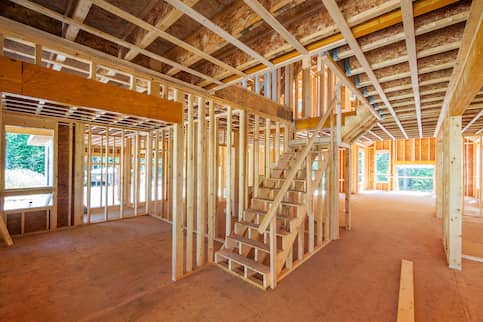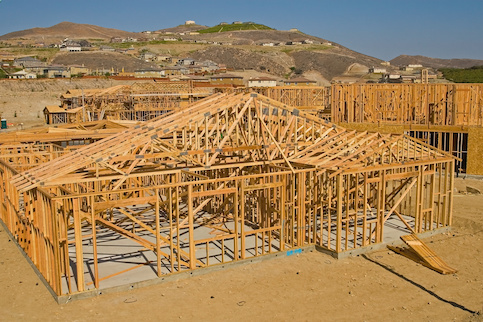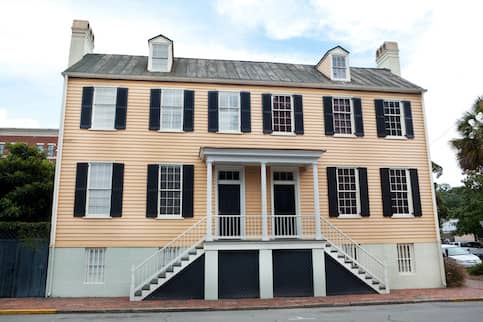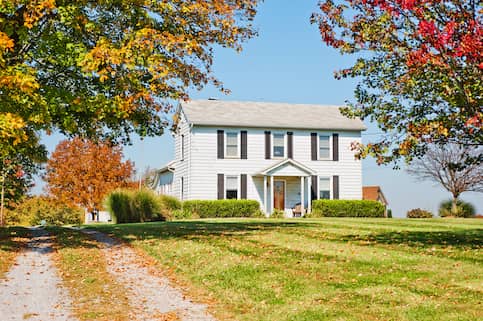Need to pay for a major kitchen remodel? Or maybe you need to buy land and fund the construction of an entirely new home. An FHA construction loan could help. First, you need to understand how this type of home loan works and how it differs from a standard FHA loan.
We’ll review that in this article, and then dive into the requirements for FHA new construction loans.
What Is An FHA Construction Loan?
Federal Housing Administration (FHA) construction loans allow you to finance renovations to an existing home or the construction of a new home. Like standard FHA mortgages, these construction loans are backed by the government. Because of this, you can typically qualify for these loans with a lower credit score than standard, short-term construction loans.
You’ll need to meet certain requirements to take out one of these loans. Depending on the project, you might also need to meet with a loan consultant. They’ll make sure your construction project meets FHA construction loan guidelines.
A construction loan differs from a traditional mortgage. You use a construction loan to fund the building or renovation of a home. A traditional mortgage is instead used solely to purchase an existing home.
Find A Mortgage Today and Lock In Your Rate!
Get matched with a lender that will work for your financial situation.
See What You Qualify For
Buy A Home
Discover mortgage options that fit your unique financial needs.

Refinance
Refinance your mortgage to have more money for what matters.
Tap Into Equity
Use your home’s equity and unlock cash to achieve your goals.
Types of FHA New Construction Loans
There are two main types of FHA construction loans. The one you’ll need depends on whether you’re building a home or buying an existing home that needs renovations.
FHA Construction-To-Permanent Loan
An FHA construction-to-permanent loan covers the costs of buying land and building a home. Once the construction of your home has finished, your lender converts the construction loan to a permanent loan. You’ll pay this permanent loan off like you’d pay off any mortgage loan – making monthly payments with interest until you pay off the loan’s principal balance.
You’ll only go through the closing process once on an FHA construction-to-permanent loan, unlike some standard construction loans. That’s a plus: Closing costs can be pricey, running 2% – 6% of the total amount you’re borrowing. Going through more than one closing could significantly increase your costs.
An FHA construction-to-permanent loan starts as a short-term construction loan. Under FHA rules, your lender must approve the contractor you’ve chosen to build your home. Once approved, your lender will draft a draw schedule for the loan based on the estimated construction process. With each draw, your contractor will be paid so that construction on your home can continue.
Once construction is done, your lender will convert the short-term construction loan to a permanent mortgage. Terms usually last 15 to 30 years. You’ll then make regular monthly payments until you pay it off.
FHA 203(k) Rehabilitation Loan
But what if you’re not building a home from scratch? That’s when an FHA 203(k) rehabilitation loan can help. There are two main types of rehab loans offered by the FHA. Both allow you to roll renovation costs into your loan amount. Let’s discuss these two options for hopeful home buyers or builders:
- Limited 203(k) mortgage: This loan allows you to add up to $35,000 to your loan amount to be used for renovating or rehabbing a home. Maybe the home costs $250,000, but you’ll need $25,000 to renovate its aging kitchen. Instead of applying for a $250,000 purchase loan, you’d instead take out a loan for $275,000. This covers the costs of both buying and renovating the property. Once you close, you pay it back in regular monthly payments, with interest.
- 203(k) mortgage: A standard 203(k) mortgage is designed for buyers taking on more expensive home repairs over $35,000. Before earning approval for this loan, you’ll have to meet with an FHA-approved 203(k) consultant. They’ll review your project and either approve or reject it.
You’ll have to apply for either of these loans with an FHA-approved lender that offers these loans. While most mortgage lenders are approved to originate FHA loans, not all lenders provide construction loans.
How Does A One-Time Close FHA Construction Loan Work?
Ready to apply for an FHA construction loan, either a construction-to-permanent or 203(k) mortgage? Here’s what you can expect.
1. Get Preapproved For A Mortgage
During the mortgage preapproval process, a lender reviews your credit and verifies your income to determine how much you can borrow. Getting preapproved is a key step in the FHA lending process. It lets you know how much you can afford to spend on either building a home or buying an existing one.
During this process, your lender will check your credit report and credit score. To qualify for an FHA loan, you need a FICO® credit score of at least 500. Be aware, though – many lenders won’t approve you for a mortgage unless your score is higher, often 580 or higher.
Lenders will also require you to provide copies of key financial documents. This includes your two most recent paycheck stubs, 2 months of bank account statements and the last 2 years of your tax returns.
2. Select A Plot Of Land
If you’re building a new home, you’ll have to select a plot of land. Make sure this land meets the requirements of the FHA. For example, you can’t take out an FHA construction loan if your land sits near an oil or gas well. Other examples include if the land is too close to an airport, or is near a flood zone.
3. Work With An FHA-Approved Consultant
If you’re taking out a 203(k) loan of $35,000 or more, you’ll need to work with an FHA-approved 203(k) consultant. This professional will review your project plans and the contractors you’ve hired to make sure they meet FHA construction standards. The U.S. Department of Housing and Urban Development (HUD) offers a tool you can use to find a 203(k) consultant.
You won’t need to meet with a consultant if you’re taking out a 203(k) loan for $35,000 or less. You also won’t need a consultant to apply for an FHA construction-to-permanent loan. Although, you will need to provide documentation to your lender showing that you’re working with a licensed contractor.
4. Close On Your Construction Loan
For a construction-to-permanent loan, you’ll first close on a short-term construction loan that only lasts throughout construction. Once construction is over, your lender will convert the loan to a standard primary mortgage.
With an FHA 203(k) loan, you’ll close for an amount higher than your home’s purchase price based on the added funds for renovating. If your home costs $250,000 and you plan on spending $50,000 on renovations, you’d take out a standard 203(k) loan for $300,000. You’d then pay closing costs on the $300,000.
Find A Mortgage Today and Lock In Your Rate!
Get matched with a lender that will work for your financial situation.
FHA Building Loan Requirements
To qualify for any FHA building loan, you’ll need to meet certain requirements.
Loan Eligibility Requirements
- Credit score: You’ll need a FICO® credit score of at least 500 if you want to qualify for an FHA loan requiring a minimum down payment of 10% of your home’s purchase price. If your credit score is at least 580, you can qualify for an FHA loan with a minimum down payment of 3.5%. Remember, not all lenders will approve you for an FHA construction loan if your credit score is lower than 580.
- Debt-to-income ratio (DTI): Your debt-to-income ratio (DTI) measures the relationship between your gross monthly income – your income before taxes are taken out – and your monthly debts. Most lenders want your total monthly debts to be no more than 50% – 57% of your gross monthly income.
- Down payment requirements: A lower down payment is one of the main benefits of an FHA construction loan. Many construction loans require a down payment of at least 10%. Depending on your credit score, you may qualify for an FHA construction loan with a down payment of just 3.5%.
Additional FHA Construction Loan Requirements
All FHA borrowers must pay for FHA mortgage insurance, both an upfront fee and an annual fee. Borrowers pay 1.75% of their loan amount as an upfront payment when they first take out their loans. The annual mortgage insurance premium (MIP) fee varies according to down payment size, loan terms and loan amount. But this yearly fee typically varies from 0.15% to 0.75% of borrowers’ loan amount.
Who Offers FHA Construction Loans?
To apply for an FHA construction loan, you’ll need to find a mortgage lender approved by HUD. You can find a list of these lenders here. The challenge? Not all lenders approved to originate FHA loans offer construction loans. You’ll have to search FHA-approved lenders in your area to find those willing to originate them.
Alternatives To FHA New Construction Loans
FHA-insured construction loans aren’t your only choice to finance the construction or renovation of a home. You can turn to several alternatives – some of these options are also insured by a government agency.
VA Construction Loan
You can fund a new home construction with a VA construction loan – a mortgage insured by the U.S. Department of Veterans Affairs (VA). The main benefit of a VA construction loan is that you don’t have to make a down payment at all. The catch? Not everyone can qualify for a VA loan. You must be an eligible veteran or active-duty member of the U.S. Military, or an eligible spouse, to qualify for a VA construction loan.
USDA Construction Loan
The U.S. Department of Agriculture (USDA) offers its own construction-to-permanent loan. Like a VA loan, you won’t have to provide any down payment when taking out a USDA construction loan. The challenge here, though, is that not everyone can qualify for one of these loans, either. You must be buying or building a home in an area that the USDA considers rural. To find out whether the land on which you want to build is eligible, check the USDA’s property eligibility site.
Local And State Construction Loan Programs
Your state or local government might offer their own loan programs designed to help buyers build a home or renovate an existing property. Check with local housing organizations or state departments to find out if your state or community offers such programs.
FHA Cash-Out Refinance
If you’re looking to renovate your current home and have already built enough equity, consider an FHA cash-out refinance. This allows you to borrow against your home’s equity. With this type of loan, you can refinance your current mortgage into a new one for more than you owe. You can then use that extra money to make renovations and home improvements.
The Bottom Line
Whether you’re building a home from scratch or buying a fixer-upper, you can finance your purchase with an FHA construction loan. You can also seek alternatives if a construction loan isn’t the right choice.
Find A Mortgage Today and Lock In Your Rate!
Get matched with a lender that will work for your financial situation.

Dan Rafter
Dan Rafter has been writing about personal finance for more than 15 years. He's written for publications such as The Washington Post, Chicago Tribune and Wise Bread.












